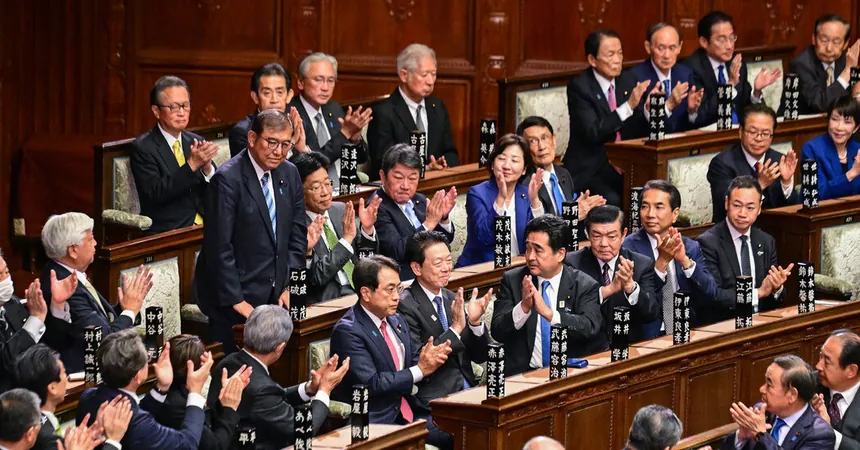
Shigeru Ishiba Secures His Position as Japan’s Prime Minister Amidst Political Turmoil
2024-11-11
Author: Wei
Shigeru Ishiba Secures His Position as Japan’s Prime Minister Amidst Political Turmoil
In a surprising turn of events, Shigeru Ishiba, Japan's prime minister, has successfully won a parliamentary vote to continue leading the nation, despite his Liberal Democratic Party (LDP) suffering significant setbacks in last month’s snap general election. The LDP now finds itself without a parliamentary majority for the first time in 15 years, forcing Ishiba to navigate the complexities of a minority government.
The ramifications of this political shake-up could be profound. Ishiba's administration is currently grappling with major issues including a political finance scandal, rising inflation, labor shortages, and the overwhelming challenges linked to Japan’s aging population. Experts predict that the prime minister may face difficulties maintaining his position, potentially leading to a cycle of swiftly changing leadership that could destabilize Japan as it prepares to engage with a newly re-elected Donald Trump in the United States.
In the recent parliamentary runoff, Ishiba triumphed over the leader of Japan's largest opposition group, the Constitutional Democratic Party, Yoshihiko Noda, with a vote count of 221 to 160. Despite his victory, nearly 20% of lower house members abstained from voting, highlighting his tenuous grip on power.
At his post-vote press conference, Ishiba remarked that operating as a minority government could foster deeper discussions among various parties, though he acknowledged, “It’s not that I’m saying it’s desirable that the ruling bloc lost the majority.” He also promised to push for reforms in political finance laws to enhance transparency and governance.
However, the path ahead looks rocky. With upper house elections looming next summer, political analysts suggest that the LDP may seek to replace Ishiba in hopes of presenting a fresh face to regain majority support. Mieko Nakabayashi, a political expert, hinted at the potential for party leadership changes as public sentiment remains volatile.
Moreover, Japan’s domestic instability could adversely affect its international influence at a time when a steady leadership is crucial. Under former Prime Minister Shinzo Abe, Japan cemented its role as a Pacific stabilizer, particularly during Trump’s first term, advocating for a free and open Indo-Pacific and countering China's regional aspirations.
If Ishiba's government continues on this unstable trajectory, experts like Phillip Lipscy warn that Japan may struggle to present a strong foreign policy, particularly as U.S.-Japan relations could face turbulence under a second Trump administration. Ishiba is keen on ensuring that both nations align for mutual interests, stating that his government must avoid a “face-to-face clash” with American priorities.
Adding to the complexity, the political landscape has been rattled by a scandal involving Yuichiro Tamaki, the leader of the Democratic Party for the People. Tamaki admitted to an extramarital affair shortly before the leadership election, prompting concerns about his candidacy's impact. Nevertheless, he received unanimous support from his party, asserting his commitment to press for significant reforms, including a tax policy aimed at increasing citizens' net income. However, analysts caution that his proposals could jeopardize Japan’s defense budget commitments by significantly decreasing tax revenues.
As the LDP acknowledges its precarious position, it’s likely that the political fallout from the scandal will be minimal, and Tamaki’s push for reforms will persist. Observers foresee that the party might rally around Ishiba or another leader to counterbalance perceived weaknesses from within.
In the wake of these developments, Japan stands at a crossroads—facing internal challenges while needing to present a united front abroad amid shifting international dynamics. The coming months will be crucial as Ishiba attempts to stabilize his leadership and address the multifaceted issues confronting the nation. Can Ishiba maintain his grip on power, or will Japan once again enter the turbulent waters of political turnover? Time will tell.




 Brasil (PT)
Brasil (PT)
 Canada (EN)
Canada (EN)
 Chile (ES)
Chile (ES)
 España (ES)
España (ES)
 France (FR)
France (FR)
 Hong Kong (EN)
Hong Kong (EN)
 Italia (IT)
Italia (IT)
 日本 (JA)
日本 (JA)
 Magyarország (HU)
Magyarország (HU)
 Norge (NO)
Norge (NO)
 Polska (PL)
Polska (PL)
 Schweiz (DE)
Schweiz (DE)
 Singapore (EN)
Singapore (EN)
 Sverige (SV)
Sverige (SV)
 Suomi (FI)
Suomi (FI)
 Türkiye (TR)
Türkiye (TR)